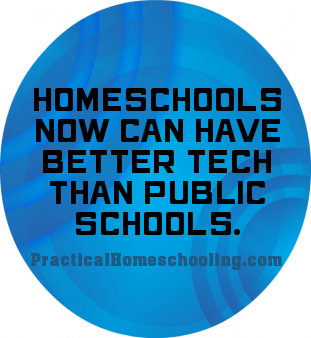 This is the most complicated issue of Practical Homeschooling ever. Its contents range from a detailed analysis of the educational features of online services to an equally detailed analysis of major curriculum packages, and from reports on major educational conferences to a side-by-side look at major homeschool methods.
This is the most complicated issue of Practical Homeschooling ever. Its contents range from a detailed analysis of the educational features of online services to an equally detailed analysis of major curriculum packages, and from reports on major educational conferences to a side-by-side look at major homeschool methods.
So now am I going to shoot myself in the foot by suggesting that the heart of homeschooling has nothing to do with all these sophisticated tools?
You betcha.
Don't get me wrong -- it's great to be on the cutting edge of education. Today, while public school districts that spent huge sums on computer technology years ago are stuck with obsolete Apple IIs and PCjr, homeschools sport up-to-date hardware. While public schools cripple themselves with incredibly expensive networked software whose main claim to fame is its fancy recordkeeping, homeschoolers pick up the very latest educational programs. Most significantly, companies that used to market only to schools are now producing "homeschool" versions of their products -- and in almost every case, the home versions are easier to use, cheaper, and more efficient than the classroom versions.
As more of America's educational resources move online, onto video, and onto disks, it becomes easier and easier to duplicate, and surpass, a classroom education. The classroom experience keeps getting fragmented into more and more meaningless projects ("Let's gather shoeboxes and spend the next week constructing a Valentine village!") and politically correct "skills." Meanwhile, homeschools are becoming more efficient and streamlined. Homeschoolers are moving away from "twaddle" and towards highly effective, easy-to-use educational programs, whereas (dare I say it?) today's schools seem heading in exactly the opposite direction.
Homeschooling is now clearly more sophisticated than classroom education.
We have more (and better) resources to draw upon. We can adapt the latest technology more quickly. We are far more committed to finding out what works, as opposed to what sounds impressive on someone's resumé.
That brings me back to my first point. It's our own kids we are teaching. All the hubbub over the latest technology and the fanciest educational method means nothing at all if these shiny new tools do not directly improve the spiritual, emotional, and academic lives of our children. That is why we at Practical Homeschooling are working so hard to stay on top of the educational tools of today and tomorrow. If we do this research, you don't have to. You will be able to both have your cake (time with your children) and eat it too (jumping right into programs you know are wholesome and will interest you).
Spend lots of time with your children. Don't get caught up in going online for its own sake while the kids run crazy in the next room. Watch while they play their educational software, or at least check in occasionally to observe their triumphs. ("Mom! I got every question right on this level of WordSmart!")
In the end, most of the new technology is a crutch designed to fill in the gaps in our own knowledge and teaching ability. The more we know, the less we need it for educational purposes. There's a world of information out there, but most of what mankind needs to know is still between the leather covers of your grandpa's Bible. Technology is fun; technology is entertaining; technology is sociable (love those message boards!); but technology is not God. If, instead of fretting about providing every underprivileged child in America with a computer, our august leaders put some muscle into removing the artificial barriers the court system has erected between American children and God, we would all be a lot better off.